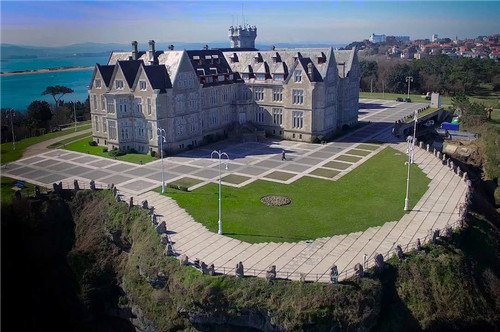The 2nd SAFERUP! Week was held from the 28th September to the 2nd October 2020 in Santander, hosted by the University of Cantabria and Santander Convention Bureau.
The week venue was the classroom “Ernest Lluch” at the Stables (Caballerizas) of the Magdalena Palace in Santander. All ESRs, supervisors from Beneficiaries and Partner Organisations were invited to join the week events. The Advisory Board members were also invited. An online connection using Zoom was available for those participants that were not joining in person.
The 2nd SAFERUP! Workshop organised by FONCE and chaired by José Luis Borau (FONCE) was held on Monday the 28th of September 2020 at the Magdalena Palace and Zoom. The title of the workshop was “Accessibility and disability social inclusion in designing urban pavements for livable cities”.
After FONCE and topic introduction, invited talks followed in this order: (1) “Accessible, inclusive, friendly streets with a small environmental footprint” by the company ZICLA and (2) “If something characterizes the Pedestrians is their vulnerability” by the company AiCROSS.
From Tuesday the 29th of September to Thursday the 1st of October, all the planned training lectures were held and all ESRs, as well as some supervisors, attended the courses.
On Tuesday morning, Course 1.3 on “Self-sensing and self-inspecting urban pavements for smart cities” was given by Prof. Filippo Ubertini (UNIPG) and Course 1.4 on “Bitumen modification and advanced additives for asphalt mixture” imparted by Dr. María González González (CEPSA). After lunch, Course 2.3 on “Replacement of virgin aggregates by recycled materials and by-products in urban pavements” was given by Dr. Piergiorgio Tataranni (UNIBO), and Course 2.4 on “Sustainability Assessment of Road and Infrastructure Constructions” was given by Prof. Florian Gschösser (UIBK).
On Wednesday morning, Course 3.3 on “Whole life cost analysis” was given by Prof. Álvaro García Hernández (UNOTT) and Course 3.4 on “Mobility management for efficient and sustainable traffic solutions in urban areas” was imparted by Prof. Günter Emberger (TUWIEN). After lunch, Course 4.3 on “Best urban pavement solutions for pedestrians” was delivered by José Luis Borau Jordán (FONCE) with the participation of Delfín Jiménez Martín (FONCE), and Course 4.1 on “Risks associated with urban pavements and their potential social consequences” and the labTOUR in the Civil Engineering School were given by Prof. Jorge Rodríguez Hernández, Dr. Pedro Lastra González and Prof. Daniel Castro Fresno (UC).
During the visit to the Civil Engineering School of the University of Cantabria, the ESRs saw the different facilities in the Road Laboratory, Geosynthetic Laboratory and Concrete Laboratory, besides the general installations. Highlighting the 3D printer and the artificial reefs, one of them being exposed in the lobby of the School (Figure 3), in the framework of the Interreg Atlantic Area Project 3D Pare (EAPA_174/2016).
On Thursday the 1st October the following transversal courses were held: Course TS.3 on “Economics and LCA training” by Prof. Florian Gschösser (UIBK) and Course TS.4 on “Basic Statistical Analysis” by Prof. Juan Amodia de la Riva (UC).
The second SAFERUP! Scrum entitled “Urban Accessibility & Society. Harmonizing the relationship between society and urban infrastructures through the implementation of accessible pavements”, chaired by Prof. Nick Tyler (UCL) and with the participation of Prof. Felipe Samarán (Universidad Francisco de Vitoria) and Dr. Carme Machí Castañer (free consultant), was held on the 1st of October. To start the dynamic of the Scrum and constitute the teams for the second part, Felipe Samarán launched to the ESRs the first challenge: introduce themselves and the aim of their research for the society.
Then, Prof. Nick Tyler (UCL) gave a inspiring lecture entitled “Accessible pavements: why you should all scream!”, followed by Dr. Carme Machí on “Reclaiming urban space for people. An accessibility-based approach based on the implementation of Green Infrastructure” and Prof. Felipe Samarán with a discussion entitled “Rock and Roll: Global caleidoscopic view”.
As final part of the Scrum, the ESRs received the second challenge and discussed about it in groups, sharing their conclusions and agreeing the final outputs of this activity as a group, realising being their responsibility, as researches, to educate the society for inclusion.

